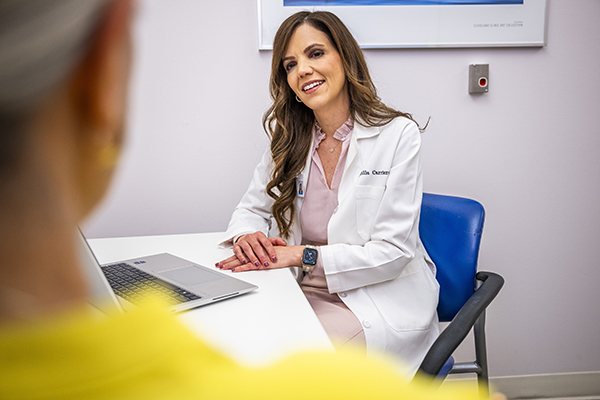Overview
When someone you love has a cognitive or movement disorder or multiple sclerosis, you may step into a care partner role. You’re ready to help but may hesitate about what to do or where to start. Your loved one relies on you — but are you doing things the right way?
Even if you have doubts, the care you provide is so important. We’ve discovered the most successful patients have a highly engaged support system. That’s why we make sure to support care partners, too.
Finding the Right Balance
At Cleveland Clinic Lou Ruvo Center for Brain Health, we hear the same thing over and over from patients’ loved ones — “I was surprised to discover I had become a care partner.”
Even if they’re newly diagnosed, your loved one may need help with daily activities. You’re ready to step in as much as you can. But sometimes, it may seem like you’re starring in a juggling act.
Maybe you wish there were more hours in a day. Perhaps you’re feeling overwhelmed — physically, mentally, emotionally or financially. You’re trying to keep so many plates spinning in the air. And you’ve quickly learned it isn’t nearly as easy as it looks.
When you’re out of sync, nothing feels right — including caregiving. We’re here to help you find more balance in your life. We want you to feel good about caring for someone who means a lot to you, while also taking care of yourself, too. It’s not hard to take the first step toward the best of both worlds when you:
- Sign up for our email newsletter to receive a monthly program calendar.
- Visit our calendar to find free education and support programs.
- Explore care partner resources in our patient guide, created by our patient and family advisory council.
We Care for Care Partners

Caregiving takes you and your loved one on an unknown path. You want to help them the best you can but may wonder how to make it all work. Our team is here to guide you along the way, from the moment you first contact us. We offer support like:
- Counseling.
- Self-care sessions.
- Respite programs.
Our programs can help you discover the best ways to confidently and compassionately care for your loved one — and find time for yourself, too.
Ongoing Support
Our team listens carefully to our patients and caregivers when we create our programming. We’ve learned you want ongoing support focusing on day-to-day care. And while these daily needs might change as things progress, we’ve discovered that they still fall into predictable categories. We’ve responded with regular group sessions focusing on:
- Skill-building and education.
- Physical, emotional and mental wellness.
- Support groups.
- Enrichment activities like remembrance activities and art projects for your loved one.
- Music therapy for your loved one.
- Access to the Lynne Ruffin-Smith Library & e-Library.
Daily programming
We offer free, online and in-person classes and most are open to anyone in the community, regardless of where your loved one gets neurological care. Generous donor support makes these offerings possible.
- View our calendar of no-cost educational, therapeutic and support programming.
- Sign up for our email newsletter, which includes our monthly program calendar.
One-on-one sessions
If you need additional support outside of a group activity, we’re here for you — and the loved one you care for. You can sign up for short-term counseling or meet with a case manager who can help you find the best resources to guide you on your journey.
These one-on-one sessions are booked quickly. To schedule one, you’ll need a referral from a Cleveland Clinic Nevada neurology provider. Haven’t seen a Cleveland Clinic neurologist? Contact us at 725.433.1648 to request a neurology appointment.
Program Calendar
We offer free educational, therapeutic and support programs daily for you and your loved one.
Explore Our Programs
Most of our caregiver programs are online, allowing you to join us from wherever you are. We also offer some in-person sessions on or near our Las Vegas campus.
To find programs that best suit your needs, you can:
Did you miss something you wanted to attend? No worries. You can watch archived Lunch & Learn lectures online at any time.
Library
Want to learn more about brain conditions and caregiving? You can check out more than 1,500 free information sources from our Lynne Ruffin-Smith Library.
In-Person or Online
Our on-site library is just inside the front door at our Las Vegas campus. It’s open weekdays from 9 a.m. to 4:30 p.m. PT.
Not sure where to start? Visit our resource desk to chat with our helpful librarians. They can answer your questions, point you in the right direction and help you sign up for a library card so you can borrow books. Our team can also register you for one of the many free online educational programs we offer daily.
Can’t make it to our campus? You can still browse our online library at any time of day or night. And it’s all free.
Advice from Families
Caregiver Conversations: First-hand Accounts of the Care Partner Journey
You’re not alone. Through these videos, you can pick up tips and tricks from others’ experiences caring for loved ones with cognitive loss. Care partners share with you what they’ve learned “on the job” to manage various syndromes commonly associated with dementia.
Our health psychologist and Angie Ruvo Endowed Chair for Caregiving joins these unpaid caregivers in conversation, offering professional insight to help maximize quality of life for both caregivers and care recipients.
Additional resources
Beyond this video series, our team of behavioral health and education professionals offer free educational, therapeutic and support programs daily. Which program might help your family?
